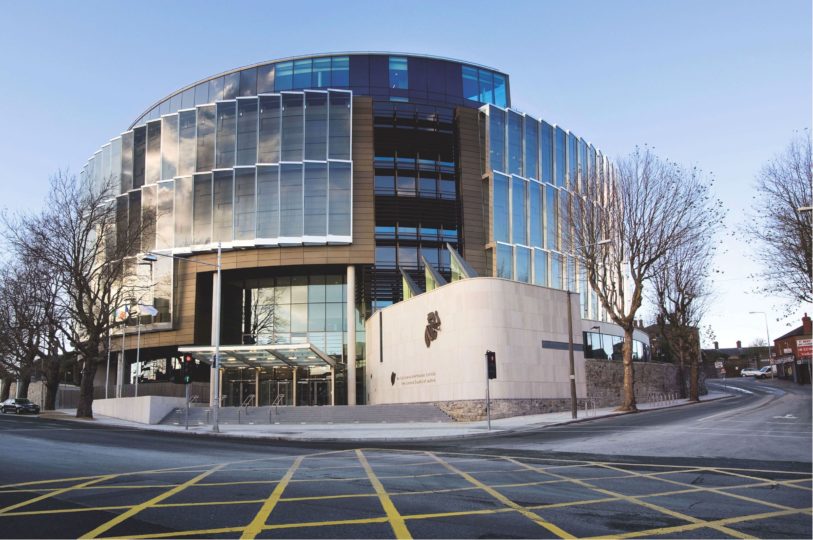
The Council of The Bar of Ireland recommends one day withdrawal of services to members in pursuit of a mechanism to determine the fees payable to barristers by the Director of Public Prosecutions and under the Criminal Justice (Legal Aid) scheme.
Fees payable to criminal barristers remain at 2002 levels, despite the ongoing delivery of efficiencies and reforms by the profession.
The Council of The Bar of Ireland has recommended withdrawal of services to its members who are criminal law practitioners, in pursuit of a meaningful, independent and time-limited mechanism to determine the fees payable to barristers by the Director of Public Prosecutions and under the Criminal Justice (Legal Aid) scheme.
The Bar of Ireland has engaged with consecutive Governments on this matter, but no progress has been made despite barristers delivering at least the same level of reform and flexibility delivered by other professional groups for whom cuts have been reversed.
Following engagement with its members over the last number of months, the Council of The Bar of Ireland has now formally written to the Government to notify it of its recommendation to members, to implement an initial one-day withdrawal of services on Tuesday October 3rd 2023 in pursuit of a meaningful, independent and time-limited mechanism to determine fees payable to barristers by the DPP and under the Criminal Justice (Legal Aid) Scheme.
Chair of the Council of The Bar of Ireland Sara Phelan SC said,
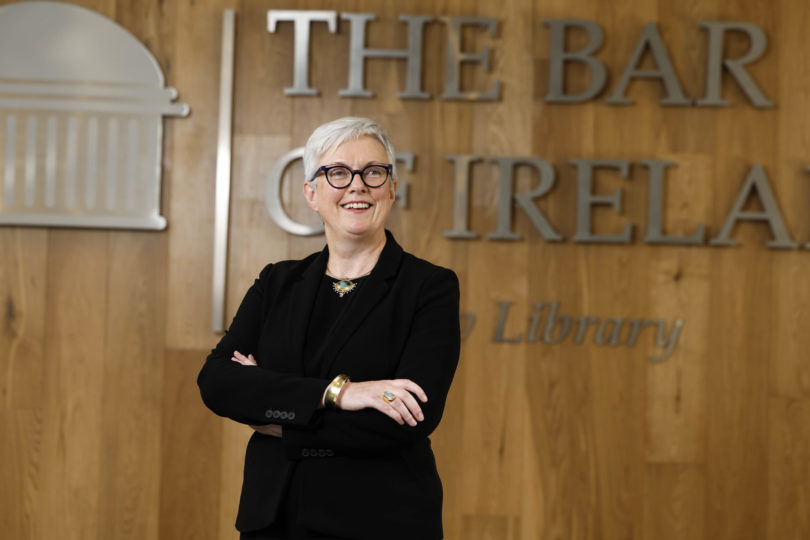
Barristers are being treated differently to other members of the criminal justice system and indeed to society at large. Despite delivering a range of changed work practices and reforms that have delivered significant efficiencies for the criminal justice system, the Government has refused to recognise this by means of fee restoration.
We have been attempting to engage with Government on this matter for seven years now and, having exhausted every avenue available to us, we have now lost confidence in Government’s commitment to the preservation of the highest standards in the administration of justice and in the existing mechanism for determining the fees payable to barristers practising criminal law.
It is with regret that we are confirming our recommendation to members to withdraw services– but we have been left with no choice. This is not an action the Council or the members of the Law Library take lightly, as we are acutely aware of the impact on everyone involved in the criminal justice system.
We have notified Government of the intended action, and, in the meantime, we remain available to actively engage with them on these important matters.
Chair of the Criminal State Bar Committee, Sean Guerin SC said,
The Office of the Director of Public Prosecutions and the Department of Justice acknowledged the flexibilities provided by our members to improve the administration of criminal justice as long ago as 2018, and further substantial reforms have been implemented since then with the cooperation of our members.
The failure by consecutive Governments to recognise this by means of fee restoration, and the targeting of the Bar as the only participant in the criminal justice system not to secure pay restoration, is a fundamental threat to the integrity of the criminal justice system
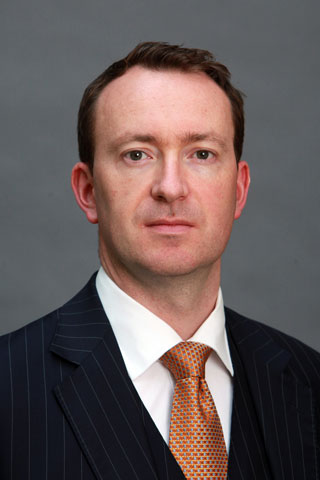
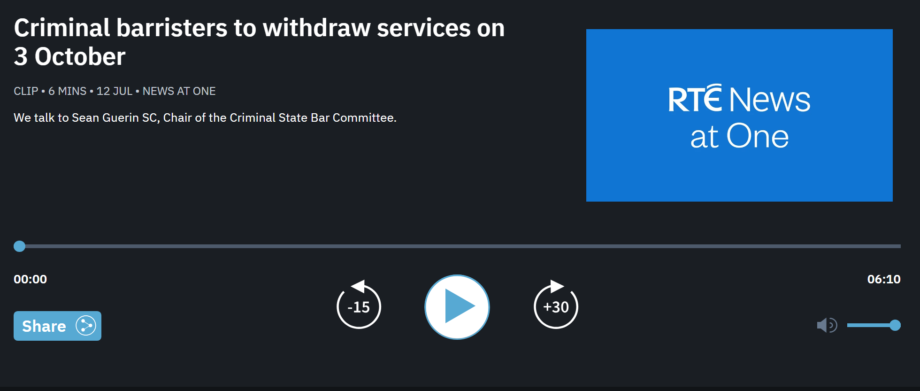
Fees for criminal barristers remain below 2002 levels in nominal terms, following a range of cuts applied during the financial emergency. In 2008 Government also unilaterally broke the link between fees paid to barristers with increases applied under public sector pay agreements. This means that barristers are paid a flat rate, with no provision for inflation or cost of living increases, in marked contrast to those employed in the public sector. In summary, barristers have suffered a pay cut in real terms of more than 40% over the past twenty years while every other sector working in the criminal justice system has seen pay restoration implemented.
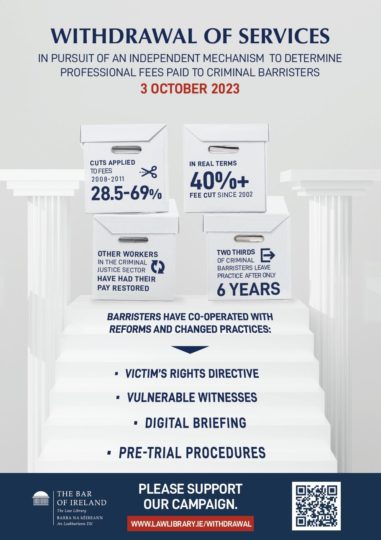
This is despite a range of additional reforms and changed practices being delivered by barristers. The outcome of a detailed review process in 2018 led by the Office of the Director of Public Prosecutions in conjunction with the Department of Justice and sanctioned by the Department of Public Expenditure and Reform, was that the ongoing flexibility being delivered by prosecuting counsel is “considered comparable to the flexibility delivered by other groups to justify the reversing of cuts imposed during the financial emergency.”
The flexibility delivered by barristers has enabled significant and valuable reforms to be implemented in the operation of the criminal justice system to improve the experience of victims, their families and vulnerable witnesses, to improve administrative efficiency and enable financial savings by the Office of the DPP, the Courts Service and other state agencies, and to save the time and effort of individual members of the public serving as jurors.
As a direct consequence of the failure to restore fee cuts, a career choice for recently qualified junior barristers in crime has become unattractive when compared to opportunities in other areas of law. Two-thirds of criminal barristers leave practice after just six years at the Criminal Bar, due to the remuneration and conditions that currently exist in criminal practice. Retention rates drop to less than a third of those who set out to pursue a career in criminal law. This is already creating issues in respect of frontline advocacy services, which if not addressed, will undoubtedly have a profound impact on the administration of criminal justice and the public good.
The Government and relevant Ministers have been furnished with The Bar of Ireland’s Pre-Budget Submission, focusing on the restoration of professional fees paid by the State to barristers. Read at:
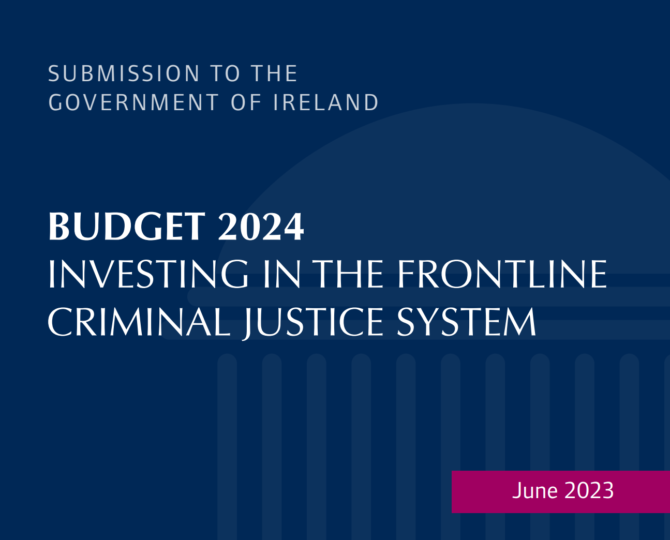
Notes:
Media contact: Q4 Public Relations Sinéad McGovern sinead@q4pr.ie 087 6411725